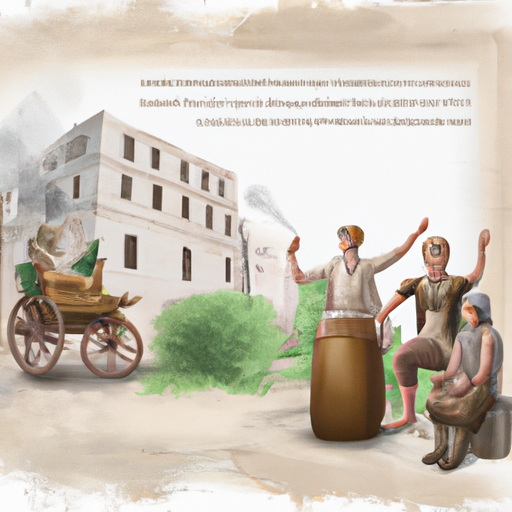History of the First Ruler of Mesopotamia
Unearth the unknown and explore the annals of antiquity! Unveil the secrets of bygone eras and uncover the story of Mesopotamia’s first sovereign! Delve into the depths of history, and unlock a world of knowledge that has remained hidden for centuries. Uncover the mysteries that lie beneath the sands of time, and unravel a tale full of intrigue and wonder. Unearth the forgotten past, and uncover the legacy of Mesopotamia’s first ruler!

Mystery and wonderment have lingered in the air for centuries surrounding the ancient world of Mesopotamia. It was here that the first ruler of this region, Sargon of Akkad, made his mark on history. Now is the time to uncover the truth and delve into this remarkable king’s legacy.
Travel back in time to explore Sargon’s rise to power and accomplishments. Understand how he unified disparate city-states into a single empire, ushering in an era of unprecedented stability and prosperity. Unearth details about Mesopotamia’s culture and customs during this period, as well as its political system that allowed Sargon to become one of the most powerful rulers in history.
Uncovering all these secrets isn’t easy; it takes dedication and effort. But with a bit of work, you can unlock the mysteries hidden beneath the sands of time and reveal a story that has remained untold for centuries. Learn about Sargon’s legacy and discover how he shaped Mesopotamia’s future—and ours!—as we continue to explore its history today.
.
Introduction

A perplexing quandary surrounds the identity of the first ruler of Mesopotamia, located in the lush and bountiful crescent of the Middle East. This region is renowned for birthing some of the most influential civilizations in human history. Historians are divided on who should be credited with this title. Some posit that Sargon of Akkad was responsible for establishing an empire around 2300 BC, while others point to Lugal-Zage-Si, who reigned around 2400 BC as a more likely candidate. Still others believe it was Enmebaragesi, whose kingdom of Kish rose to prominence circa 2600 BC, that should be given precedence.
– History of the Rise of Mesopotamian Rulers
Throughout the ages, a succession of mighty rulers have left their mark on the land of Mesopotamia. Located in what is now Iraq, this ancient civilisation was home to some of the earliest known civilisations, each with its own powerful king or queen who sought to expand their dominion.
The first ruler to be recorded was Sargon I, reigning from 2334-2279 BCE and establishing the Akkadian Empire across much of modern-day Iraq, Syria, and Turkey. His son Naram-Sin then took control and expanded this influence even further.
The Babylonian period was marked by Hammurabi’s rule from 1792-1750 BCE. He is most remembered for creating the Code of Hammurabi which set out harsh penalties for crimes such as theft or murder. During his reign, architecture, literature, mathematics and astronomy all advanced significantly.
The Assyrians rose to prominence around 1100 BCE, creating an empire that extended throughout much of the Middle East and Anatolia. They were famed for their military prowess and engineering skills which enabled them to build impressive structures such as canals and palaces. The last great Assyrian ruler was Ashurbanipal (668-627 BCE) before his kingdom collapsed due to internal conflict and foreign invasions from powers like Persia.
The legacy of Mesopotamian rulers continues to be felt today in many areas – science, technology, art, literature, lawmaking and warfare tactics are just some examples still studied by historians worldwide.
– The Role of Sargon I in Mesopotamian History
Awe-inspiring and far-reaching, Sargon I’s reign over Mesopotamia was nothing short of remarkable. His unification of the Sumerian city-states, establishment of the first true empire in the region, and introduction of taxation and a system of laws enabled him to maintain control over a vast territory and ensure its stability. Moreover, his encouragement of trade and commerce spurred economic growth throughout Mesopotamia.
Today, Sargon I’s legacy remains significant; he is remembered as one of the most influential rulers in ancient history, with his accomplishments still studied by historians. His military prowess enabled him to expand his empire and gain control over much of the Middle East, while his administrative reforms laid the groundwork for future empires such as the Assyrian Empire and Babylonian Empire to build upon.
In sum, Sargon I’s mark on Mesopotamian history is unmistakable; it is felt not only in his successful expansion of territory, introduction of new methods for governing, encouragement of trade and commerce, but also in his lasting legacy that shaped future empires.
– A Look at the Impact of Mesopotamian Rule on Ancient Cultures
A land of mystique and antiquity, Mesopotamia was home to some of the earliest known empires. This area, located in modern-day Iraq, has left an indelible mark on human history and its influence can still be seen in many aspects of our lives today. From complex systems of government and law to sophisticated irrigation systems and art forms, this article will explore the impact that Mesopotamian rule had on ancient societies.
The region’s strategic location at the crossroads between Europe and Asia made it an ideal hub for international commerce. This allowed these early civilizations to develop trade networks that reached far beyond their borders. As a result, their legal codes served as a basis for many later laws throughout the Middle East and Europe while their sophisticated irrigation systems were adopted by other cultures in order to increase agricultural productivity.
Mesopotamian art forms such as cylinder seals were widely copied by other cultures around the world. Additionally, they developed one of the first written languages which would eventually become the basis for all modern writing systems. Their influence can also be seen in many aspects of Greek culture such as philosophy and architecture; their legal codes served as a basis for Roman law; their astronomical knowledge was adopted by early astronomers; and their religious beliefs influenced Judaism, Christianity, and Islam alike.
Even today we see traces of Mesopotamian culture in our own language, art forms, laws, and religions – making it clear that this ancient civilization has left an enduring legacy that continues to shape our lives today.
– Exploring the Legacy of the First Ruler of Mesopotamia
Examining the heritage of the first sovereign of Mesopotamia is a fundamental piece of seeing how this old human advancement advanced. The Akkadian Empire, established by Sargon I in 2300 BCE, was one of the soonest realms ever and saw significant advances in innovation, governmental issues, and culture. Through archaeological proof, we can find out about Sargon’s standard and its effect on Mesopotamian society.
Sargon I is credited with joining a lot of Mesopotamia under a solitary government unexpectedly. He constructed a solid military power to secure his realm from its adversaries and made an administration to deal with the issues of state. He additionally set up exchange relations with different forces in the locale and created irrigation frameworks to improve agrarian creation. Under his rule, urban areas flourished and specialists delivered delightful works of art that are as yet respected today.
The inheritance of Sargon I can be found in numerous parts of cutting edge life. His authoritative improvements were received by later rulers all through the world, while his military strategies have been contemplated by present day strategists. His accomplishments in designing helped to shape how human advancements oversaw their assets for centuries afterward. Additionally, his support of expressions and culture urged innovativeness among his subjects which left an enduring imprint on Mesopotamian culture.
In general, investigating the legacy of Sargon I gives profitable knowledge into how this old human advancement created after some time and gives setting for understanding its place in world history today. By examining his rule, we can pick up a more profound appreciation for the commitments he made to this district’s improvement and increase understanding into how our own societies developed from these early foundations.
– Analyzing the Historical Significance of Mesopotamia’s First Ruler
Amidst a time of great tumult and upheaval, one figure rose to the challenge – Sargon of Akkad. From ca. 2334–2279 BCE, this ruler’s reign brought about an unprecedented unification of disparate city-states, ushering in a period of economic prosperity and stability. His legacy is remembered for its innovations in law, government, military strategy, and architecture.
Sargon’s laws were recorded on clay tablets that still exist today; his bureaucracy allowed for effective governance over an extended period; his military campaigns brought peace to the region by defeating rival kings; and he built numerous monuments throughout his empire including temples and palaces which remain standing today as reminders of his reign.
No doubt can be cast on the historical significance of Sargon’s rule – it laid the foundation for many aspects of modern life that we take for granted today such as legal systems, international trade networks, and complex bureaucracies. It marked a pivotal point in Mesopotamian history when it transitioned from small city-states into a unified empire with far-reaching influence across multiple cultures and regions. The impact of this first ruler continues to shape our understanding even today.
conclusion

A mysterious figure, thought to be the initiator of a remarkable era, is credited with unifying an ancient land and birthing a new epoch. Historians have agreed that this individual was Sargon of Akkad, who in 2270 BCE assumed control over Mesopotamia and formed the Akkadian Empire. This momentous event marked the commencement of documented history in Mesopotamia, and its impact on global history remains immense.
.
Some questions with answers
Q1. Who was the first ruler of Mesopotamia?
A1. The first ruler of Mesopotamia is believed to be Sargon of Akkad, who reigned from 2334-2279 BC.
Q2. When did Sargon rule?
A2. Sargon ruled from 2334-2279 BC.
Q3. What is the historical significance of Sargon’s reign?
A3. Sargon is credited with unifying much of Mesopotamia and creating the world’s first empire, which stretched from the Mediterranean Sea to the Persian Gulf.
Q4. How did Sargon gain power?
A4. According to ancient texts, Sargon rose to power through a series of military conquests and alliances with other city-states in Mesopotamia.
Q5. What impact did Sargon have on history?
A5. In addition to creating the world’s first empire, Sargon is credited with establishing many political and legal reforms that were later adopted by other civilizations throughout history.




